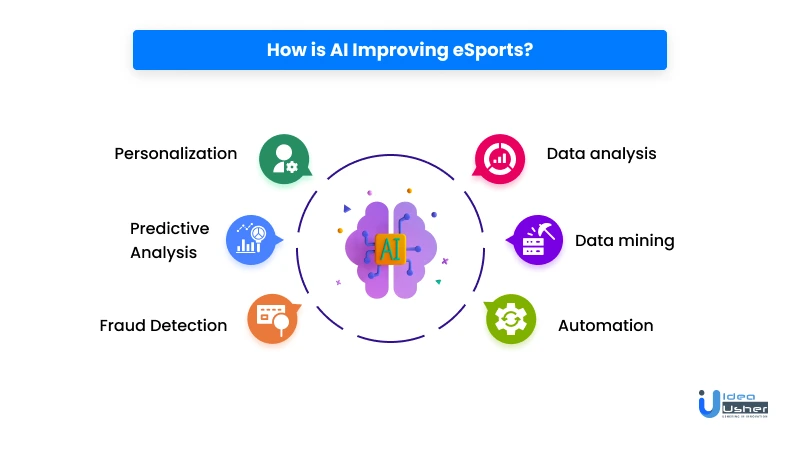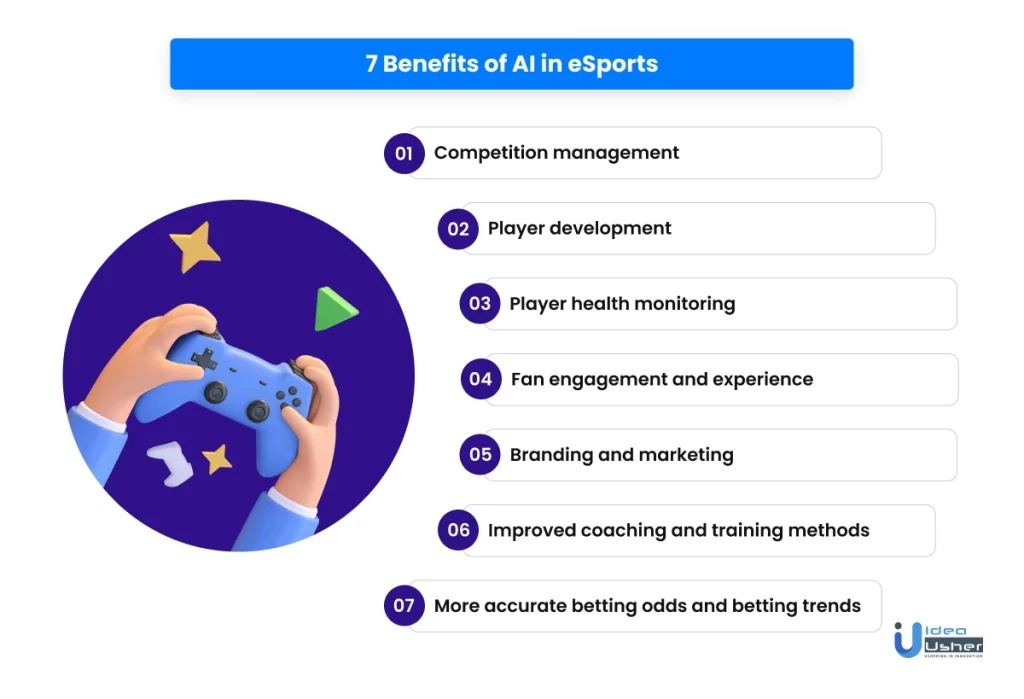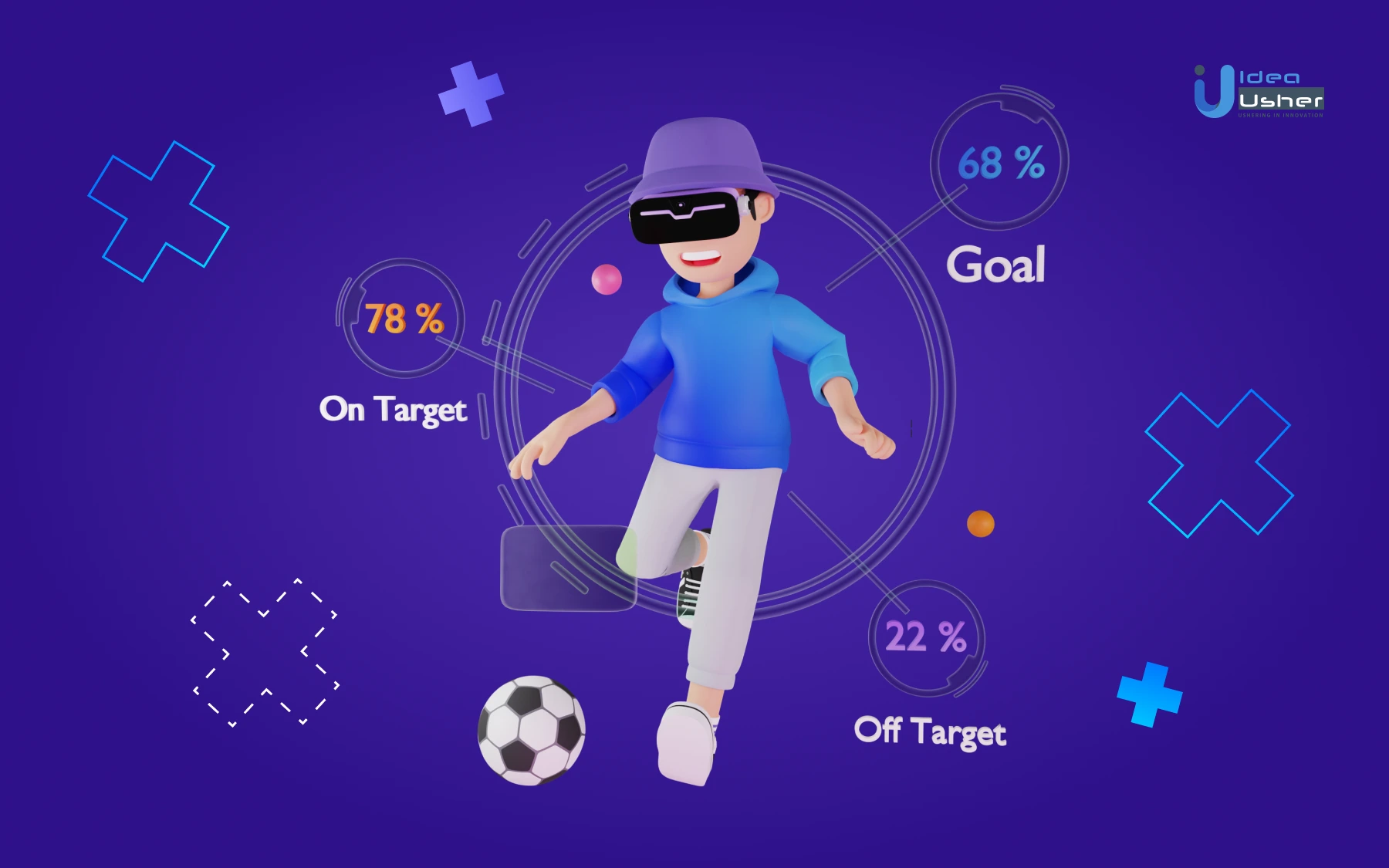Where does the future of esports lie?
Las Vegas, the casinos?
No, it lies in an amphitheater of thousands of online viewers, cheering on screens — a titan in digital entertainment.
The eSports industry is growing at an enormous rate and will reach $2174.8 million by 2023. With the rise in popularity comes more opportunities for investors and entrepreneurs to enter this space. However, it’s essential to understand how AI in the eSports industry can be used.
It is a new era of eSports competitions, which experts call “competitive gaming”. AI will play an essential role by helping players train for upcoming matches and tournaments without requiring them to spend hours practicing manually on their own.
Market Potential of eSports
At a glance:
| Global Audience | 532 million |
| Age Group | 21 to 36 years |
| Major Demographic Location | Southeast Asia and Latin America |
| Revenue | $1.38 Billion (by the end of 2022) |
| Mobile eSports Examples | Mobile Legends: Bang Bang, League of Legends: Wild Rift |
Source: Newzoo
It’s no surprise that companies like Amazon and ESPN are jumping on board to capitalize on this rapidly expanding market.
Here are the top factors driving the growth of eSports:
1. The rise of mobile gaming
Mobile games are much more accessible than PC or console games because they do not require a high-end computer or gaming console to play them. This has made them very popular among users who prefer casual gaming over hardcore gaming.
2. The growth of streaming platforms
Video games have become a spectator sport, and more people are watching them. Streaming platforms like Twitch and YouTube Gaming allow gamers to share their gameplay with the world. More people are watching esports than ever before, which is driving interest in the industry.
3. Technology convergence
Video games have evolved from arcade machines to mobile devices, PCs to consoles, and standalone hardware to cloud-based gaming services. This convergence has enabled developers to create cross-platform titles that can be played on any device.
4. Millennial spending power
Millennials are a large demographic, accounting for more than half of the U.S. population. They’re also very influential in purchasing decisions. Thus, they’re a key demographic for marketers looking to reach their audience through digital ads.
AI in Online Gaming Development and Programming
Artificial intelligence (AI) has been present in games for years. It is often used to create nonplayer characters (NPCs) that can interact with the player. Sometimes, these NPCs are highly complex and have their personalities and goals.
Here are different ways AI can enhance the development process of eSports and iGaming platforms.
1. Making games more realistic
One of the main reasons people play video games is because they like to escape reality for a little while and experience something new. We’ve all had that moment where we’ve been so immersed in a game that we forgot what time it was or were so absorbed in what was happening on screen that we didn’t hear someone knocking on the door or calling out our name. This feeling comes from being able to get lost in another world — one where you’re not just playing a character but experiencing life through them.
2. Enhancing game experience
Another advantage of using AI in online gaming development is that it helps to enhance the game experience. Since AI controls non-human characters in video games, it can make a game more realistic. This can help players feel like they are part of the action when playing games such as FPS (first-person shooter). It also allows players to interact with these non-player characters (NPCs). Also, build relationships through conversations or by giving them gifts.
3. Smarter games
In recent years, developers have been using artificial intelligence to develop smarter characters for their games. This has resulted in several games where players can interact with other players or NPCs without having to worry about whether or not humans or computers have programmed them.
One of the most common methods for developing smart games is bots or bots that have been programmed to interact with users based on their input and actions within the game world itself.
4. Revolutionizing multiplayer games
They have been around for a long time, but they’ve become popular in recent years. As such, developers are looking for new ways to improve the experience for their players. The best way to do this is through artificial intelligence.
Another reason developers are using robots instead of real people is that they can be programmed to do exactly what you want them to do in the game. If there are certain areas where players tend to get killed repeatedly by bots (or other players), those areas can be modified so that they don’t happen as often anymore!
How Does AI in eSports Work?
Artificial intelligence (AI) is a massive part of the future of eSports. The technology is already being used in games like Fortnite and League of Legends, where AI-powered bots can play against human players.
So how does AI work? The basic idea behind AI is that it’s a computer program that can learn from experience and adapt its behavior accordingly. In other words, AI programs can “learn” by playing against humans and analyzing their own mistakes to be better prepared for future matches.
For example, if an AI program loses 90% of its matches against humans, it’ll need some way to improve its performance before winning more games. This process is machine learning, which uses algorithms to improve over time using data from previous matches and feedback from developers or users watching these games.
How is AI Improving eSports?
As the popularity of eSports continues to increase, so does the need for technology to support it. This is clear through the rise of artificial intelligence (AI) and machine learning (ML), which improve player performance and enhance fan engagement.

Here are six features of AI that can help eSports:
1. Data analysis
Data analysis is at the core of all sports, but it’s essential in eSports because of the sheer amount of data. With so many competitions happening worldwide, teams and players need tools to help them make sense of this data overload and find insights they can use to improve their performance — or even spot potential future stars.
SenpAI, for example, provides in-depth data on the player’s history. This data can be used as guidance to improve one’s game.
2. Data mining
Data mining allows you to look for patterns in large amounts of data and apply those patterns to new situations, which means you can start making predictions about how certain events might unfold based on experiences with similar situations. To identify strategies that work best under certain conditions, you can also use data mining tools to find correlations between different factors. For example, player performance, opponent strength, and team chemistry.
3. Automation
Automation is a big part of the future of eSports. By incorporating AI-powered automation into their platforms, eSports companies can ensure that their customers enjoy a seamless experience from start to finish — from signing up for an account to playing a match, winning or losing, and everything in between. Automation can also be used for live streaming or providing fans with social media content. Such automation in developing opponents can be seen in OpenAI Five.
4. Personalization
This is another way that AI can help eSports companies improve their overall user experience. Personalization means tailoring content to suit each player’s unique needs and interests — which means that every player gets exactly what they want from their experience with your company or game.
5. Predictive Analysis
Using AI-powered technology, eSports organizations can analyze player performance and determine whether players are likely to win or lose a match. They can also use this data to predict when certain players will likely leave their teams and how long they will remain as part of their team before leaving for another team. This analysis allows eSports organizations to decide who to recruit and keep on their team roster based on stats rather than guesswork or gut instinct.
6. Fraud Detection
Fraud is a major concern for eSports betting operators as it can be difficult to detect whether a user is cheating or not. AI can detect fraudulent behavior like money laundering, account sharing, and identity theft. These actions are usually done manually by employees who have to monitor all the transactions on an eSports platform. However, these employees can use AI to focus on other tasks requiring their attention.
7 Benefits of AI in eSports
The use of artificial intelligence (AI) in eSports offers many benefits across a range of areas, including:

1. Competition management
AI-powered competition management software can help alleviate some of this pressure by automating many repetitive tasks and providing valuable insights into player performance.
For example, AI can automatically detect cheating or malicious activity within games, saving users time when they’re reviewing matches. This frees up more time for them to focus on other aspects of the competition, such as player communication, marketing efforts, and more.
2. Player development
Players can also benefit from AI-based training tools that help them improve their skills across all aspects of the game, including shooting accuracy, decision-making, and positioning. These tools enable them to work on specific aspects of their play without needing expensive equipment or expert coaches on hand at all times.
3. Player health monitoring
AI can monitor player health during competition and identify potential risks that may affect their performance. This way, teams can make sure they’re at their best when they need to perform at their best. For example, players with too many drinks or recreational drugs may risk injury or inappropriate behavior during a match.
4. Fan engagement and experience
AI is transforming the way fans interact with eSports. It’s giving them more control over their experience and helping to create a more personalized, immersive one.
AI can personalize the viewing experience for each fan by analyzing their preferences, past viewing history, and other data points. Hence, making it easier for viewers to find content that interests them rather than navigating through a sea of content they’re not interested in.
5. Branding and marketing
In eSports, it’s not just about how good you are at your game. It’s also about how well you can market yourself and get your name out there. AI has already proven an effective tool, with many professional eSports players using it to create custom graphics and videos to promote themselves and their sponsors.
6. Improved coaching and training methods
AI in eSports will improve coaching and training methods. This is because AI can analyze the data from players’ practice sessions and provide feedback to coaches on how to improve their performance. With this feedback, coaches can modify their training plans and make adjustments as necessary.
AI also can spot trends in player performance over time, which can help coaches identify when players are struggling with certain aspects of their gameplay. Coaches can use this information to give targeted feedback on what areas need improvement.
7. More accurate betting odds and betting trends
Using machine learning algorithms — which allow computers to learn from data without being programmed — allows bookmakers to offer more accurate odds on events within their platform than traditional methods where humans manually calculate probabilities based on past results.
Wrapping Up
A few decades ago, eSports wasn’t even on the radar. But today, it’s a multi-billion dollar industry that’s growing exponentially.
In fact, brands like Coca-Cola and Nissan have already invested in eSports, with Coke sponsoring Overwatch, e-NASCAR, paiN gaming, and Nissan joining hands with FaZe Clan and OpTic Gaming.
With this kind of growth potential, it’s no wonder that more and more brands are turning to eSports to reach their target audience.
But what does it mean for your business? And how can you get started with AI?
At Idea Usher, we’re helping companies like yours leverage the power of AI to transform their businesses. We’re experts at using machine learning and deep learning algorithms to create innovative solutions that will give your business a competitive edge in this new era.
We’ve helped our clients improve their product development process by using AI-based systems that can help them make better decisions about what features should be included in their products or services. Additionally, we’ve used machine learning algorithms to predict customer behavior with great accuracy — which means we can tell you exactly how likely someone is to buy something from you before they even do so!
Connect with us to learn more about how AI and ML can transform eSports.
E-mail: [email protected]
Phone Numbers : (+91) 946 340 7140, (+91) 859 140 7140 and (+1) 732 962 4560
FAQs
1. How is AI used in eSports?
One of the most important technological advancements for eSports is artificial intelligence (AI). AI has various applications to enhance the viewing experience for eSport fans and make it easier for players to train.
2. Can AI build games?
Yes. Artificial intelligence (AI) can be used to create video games with unpredictable outcomes.
3. Does FIFA use AI?
FIFA uses artificial intelligence (AI) to help players improve their skills and become better at the game as they play it more often. AI improves gameplay by ensuring that each player has an equal chance of winning each match, regardless of how well you know how to play.
4. What AI tools are used in eSports?
The most common AI tools in eSports include machine learning, deep learning, NLP, and more.






















